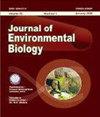假单胞菌PNPG3菌株对硝基苯酚的脱色及基因组序列的初步报告
IF 0.7
Q4 ENVIRONMENTAL SCIENCES
引用次数: 0
摘要
目的:研究菌株PNPG3对对硝基苯酚的脱色(伴随损耗),并测定该菌株的基因组序列,以了解其潜力。方法:在三种不同的试验条件下对PNP的脱色(同时去除)进行了比较研究。实验在一升容量的肖特-杜兰瓶中进行。提取基因组DNA,并使用Illumina HiSeqX平台测定基因组序列草案。使用几种生物信息学工具(RAST、PATRIC和NCBI的PGAP管道)对原始读数进行组装并进行子系统分类。基因组序列保存在NCBI基因组数据库中,菌株PNPG3也保存在昌迪加尔的MTCC、IMTECH。结果:菌株PNPG3在所有三组实验中都能进行脱色并同时去除PNP,其中包括一组仅使用蒸馏水的实验。记录了D组(最小培养基,MM;PNP和游离细胞)、E组(MM、PNP和固定化细胞)和B组(蒸馏水,PNP和自由细胞)条件下的最佳脱色能力(同时去除PNP)。菌株PNPG3的基因组草图序列大小为6566321bp,GC含量为62.26%。该基因组包含6210个蛋白质编码序列和66个tRNA基因。不同类型蛋白酶和铁载体受体的预测存在表明其可能具有工业应用和植物生长促进活性的潜力。解释:假单胞菌菌株PNPG3即使在蒸馏水存在的情况下也能对对对硝基苯酚进行脱色,并且能存活12天。基因组序列显示,该菌株携带负责芳香化合物代谢、趋化性、蛋白酶和铁载体受体的基因,这表明该菌株具有多功能性。关键词:脱色、对硝基苯酚、假单胞菌、RAST、异源生物本文章由计算机程序翻译,如有差异,请以英文原文为准。
Decolorization of p-nitrophenol and draft genome sequence of Pseudomonas sp. strain PNPG3: A preliminary report
Aim: To study decolorization (with concomitant depletion) of p-nitrophenol by a bacterial strain designated as PNPG3 and determination of draft genome sequence of the strain to understand its potential. Methodology: A comparative study of PNP’s decolorization (with concomitant removal) in three different test conditions was undertaken. The experiment was carried out in one-liter volume Schott Duran bottles. Genomic DNA was extracted and draft genome sequence was determined using Illumina HiSeqX platform. Raw reads were assembled and subjected to subsystem classification using several bioinformatics tools (RAST, PATRIC, and NCBI’s PGAP pipelines). The genome sequence was deposited at the NCBI Genome database and the strain PNPG3 was also deposited at MTCC, IMTECH, Chandigarh. Results: The bacterial strain PNPG3 could carry out decolorization with concomitant removal of PNP in all three sets of experiments, including one set, where only distilled water was used. The best decolorization (with concomitant PNP removal) capacity was recorded for set D (with Minimal Medium, MM; PNP, and free cells) followed by set E (MM, PNP, and immobilized cells) and set B (distilled water, PNP and free cells) conditions. The size of the draft genome sequence of the strain PNPG3 was 6,566,321 bp, with 62.26% GC contents. The genome had 6210 protein-coding sequences and 66 tRNA genes. The predictive presence of different types of proteases and siderophore receptors indicated its possible potential for industrial applications and plant growth-promoting activities. Interpretation: The bacterium Pseudomonas sp. strain PNPG3 has the capacity to decolorize p-nitrophenol even in presence of distilled water and it remains viable for up to twelve days. The genome sequence revealed that the strain harbored genes responsible for the metabolism of aromatic compounds, chemotaxis, protease, and siderophore receptors indicating the versatile nature of the strain. Key words: Decolorization, P-nitrophenol, Pseudomonas sp., RAST, Xenobiotic
求助全文
通过发布文献求助,成功后即可免费获取论文全文。
去求助
来源期刊

Journal of environmental biology
ENVIRONMENTAL SCIENCES-
CiteScore
1.70
自引率
0.00%
发文量
92
审稿时长
3 months
期刊介绍:
Information not localized
 求助内容:
求助内容: 应助结果提醒方式:
应助结果提醒方式:


